
As a nerdy German-American kid growing up in the late 1970s and early 1980s, I was bullied a lot.
There was the normal stuff like making fun of my haircut and clothes, derogatorily comparing me to some non-aspirational celebrity of the moment, and telling that me I talked funny or my teeth weren’t perfectly straight.
No big deal, in the grand scheme of things. Just part of growing up in the era.
The thing that was different was being called a Nazi.
This wasn’t like today. It wasn’t about politics or ideology. It wasn’t about anything I said or did.
It was simply because American culture at the time was still saturated with leftover 1940s propaganda pushing the idea that all Germans were Nazis. The kids were just manifesting what they were getting from the media, from their parents, and from their grandparents.
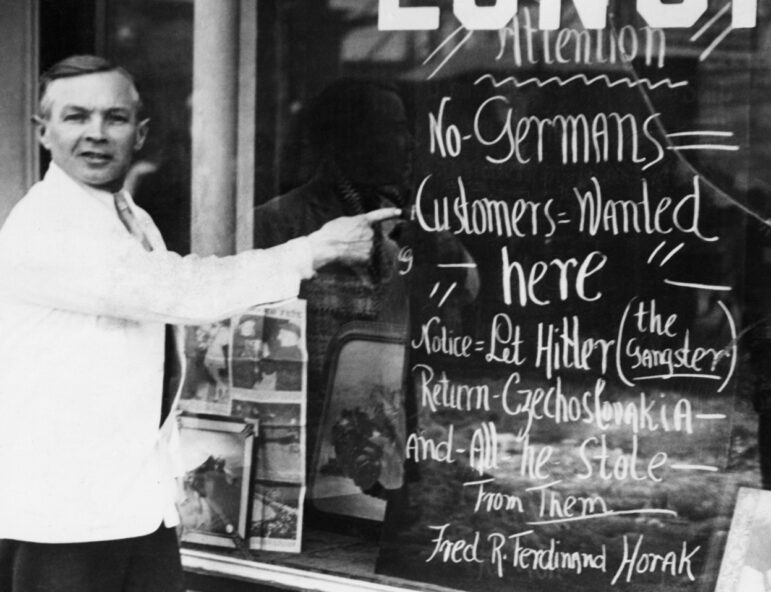
Fred Horak pointing to an anti-German sign in the window of his restaurant in Somerville, Massachussetts (March 18, 1939) [Public domain]
One Halloween, when I was young enough to still go trick-or-treating with my parents, a pair of boys from my school ran around my block chanting “Nazi! Nazi! Nazi!” while I stood there in my out-of-the-box Darth Vader or Spider-Man costume.
Around that same time, one of my dad’s colleagues from the Loyola University of Chicago philosophy department drunkenly called our house at around three in the morning to call him a Nazi.
When my dad was the age that I was then, he was in an extermination camp.
Childhood’s end
Eight years ago, I wrote in detail about my father’s experiences for my regular column here at The Wild Hunt. Here’s a shorter version.
He was born in Karavukovo, a German farming village founded by settlers who left Swabia in southwestern Germany and traveled on the Danube River in the 1700s. It was in Hungary then, but it’s changed hands over the years and is now part of Serbia.
When my father was born in the early 1930s, the villagers still spoke the same dialect spoken by their ancestors two centuries earlier. They had minimal contact with Germany. Teachers were sent from Austria for the rudimentary schooling needed by kids in a pre-electric farming community.
My great-grandfather was one of the village elders calling for Magyarization, for accepting that – after two hundred years away from Germany – they were Hungarians.
When the war began, some locals tried to force men to “volunteer” for the German military. My grandfather had no interest in fighting in a foreign land for a foreign power, so he repeatedly hid from the conscription gang. A friend betrayed him during the third roundup, and he was forced into service. Totally untrained and quickly captured, he sat in a Siberian prisoner-of-war camp for many years, until long after the war was over.
Back in the village, the Russians came through and forced my father – still a little kid – to drive the family horse-drawn wagon to the front with their large machine gun in the back. During the battle, he leaped onto one of the horses and escaped back to the village.
Then Marshall Tito’s Yugsolavian Partisans showed up. They killed any combat-age men and carted the children, women, and elderly to an anti-German extermination camp.
That’s where my father finished his childhood. More accurately, that’s where his childhood was finished off.
Eventually, my father learned how to escape the camp and made multiple trips leading other prisoners out, across Yugoslavia, and up to the Hungarian border. Afterwards, he always returned and snuck back in.
When he was confident in the route, he led his own family to freedom. After they were finally safe and the nightmare finally over, his mother sent him back into Partisan territory to rescue his grandparents.
He did so, then he led all of them across Hungary to settle into a displaced persons camp in the British zone of Allied-controlled Austria.
He was twelve years old.
Teaching human rights
After making up all the schooling he had missed and then attending the equivalent of American high school, he entered the Society of the Divine Word monastery near Vienna.
Having seen man’s inhumanity to man at first-hand, he struggled with the fact that good Christian people committed endless atrocities against other good Christian people. He wanted to understand why both civic and religious institutions had failed to stand against the forces perpetrating the horror.
The seminary did not provide the answers he sought.
From theology and church history, he moved on to literature and then philosophy. He and his group of friends left the order and the church, mostly becoming anthropologists. My father became a philosopher.
After studies at University of Bonn and postdoctoral fellowships at Yale University and University of Texas at Austin, he became a professor at Loyola University of Chicago and taught there across the decades, for the rest of his life.
A major focus of his teaching and writing was on human rights. His wartime trauma was always just under the surface, and he channeled it into his classroom, his publications, and his lectures at Holocaust Memorial events.
When discussing the mass violations of human rights during the Second World War, he often focused on two major points.
First, that what matters is deeds, not words. Totalitarian regimes commit the grossest atrocities while spouting the most self-aggrandizing propaganda about their glorious mission to make their country great again.
Second, that memorializing must lead to action. We must study the horrors of the past, but not as if they are a frozen moment at which we simply gaze. We must recognize when the horrors return in new forms and stand against them.
He was absolutely committed to the principle that we must not personally surrender to authority. Instead, we must act on our convictions. We must refuse to obey and refuse to become cogs in the totalitarian machinery.
For most of my childhood, my father was still a German citizen with a green card. He finally became a United States citizen during the Reagan years, so that he could continue to speak freely on political issues without fear of deportation.
Nazis, Nazis everywhere
I grew up in a time when a German accent was Hollywood shorthand for villainy, when George Lucas (always fond of stereotypes) simply dressed his outer space villains in SS uniforms and didn’t need to explain anything further. Eventually, producers switched over to Arabic accents and Muslim beards for their propagandistic shorthand.
My father was always frustrated that all of German history, literature, music, art, and philosophy was brushed aside by Americans who were only taught one fact about the nation: Germans are Nazis.
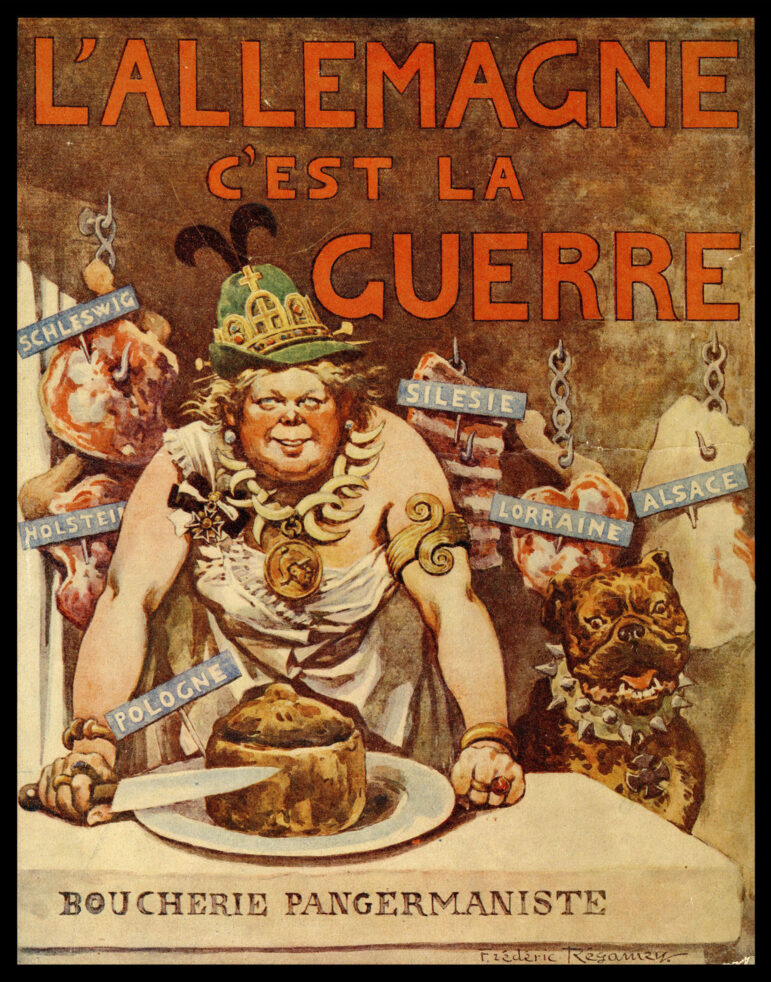
“Germany Is War” (France, 1914) [Public domain]
My father once got mad at me for watching afternoon reruns of Hogan’s Heroes, the sitcom about soldiers in a prisoner-of-war camp run by comically inept Nazis. There was nothing funny about the camps, he said.
More importantly, he continued, the Nazis were not comically inept. They were serious, and they were efficient. They made the trains run on time, and those trains were headed to the gas chambers.
Decades later, the singer of a country band I was in became a teacher in Chicago Public Schools. For the unit on European history, the only book allowed and required by the administrators was Maus: A Survivor’s Tale, Art Spiegelman’s graphic novel about his experiences during the Holocaust.
When reading it, one of the students raised his hand.
“So the Nazis were German,” he said.
“Yes,” she replied.
“Isn’t your last name German?”
She told us that, as the whole class looked up from their books and stared at her, she could almost hear the gears turning in their heads.
When you’re only taught one thing, that thing explains everything else for you.
For much of my life, Americans saw all Germans throughout all time as somehow inherently evil.
I’ve seen Wagner blamed for causing the Holocaust. I’ve seen the Brothers Grimm blamed for causing the Holocaust. I’ve seen Beethoven called an impotently frustrated rapist, but I can’t remember if he was blamed for causing the Holocaust, too.
Relatively recently, back in 2012, there was a book published by W.W. Norton blaming the Roman historian Tacitus for – you guessed it! – causing the Holocaust. Why? Because he wrote a book in the year 98 CE about German tribes.
The narrative proposition that, across thousands of years, Germans are uniquely predisposed to evil still lingers on in modified form in outsider reactions to Ásatrú and Heathenry – new religious movements built upon ancient Germanic polytheist religions.
Interfaith fails
While studying at the University of Chicago Divinity School, I met with a professor whose reputation was built on the work he had published on Norse, Germanic, and Indo-European mythology and religion early in his career. After finding out that his major professor had supported Christian fascists in Romania in the 1930s, he repudiated his own work, denounced the field he had worked in, and turned to overtly Marxist analyses of the same material.
Our meeting consisted of the professor telling me that everyone who had ever studied or written on my chosen subject – Norse, Germanic, and Indo-European mythology and religion – had been a fascist. No matter what I said about my own academic interests or political perspectives, he doubled and redoubled down.
Eventually, he stood on a ladder and literally threw books from his towering shelves down at me, ranting about all-pervasive fascism. Later, I picked up some of those books when he left them in discard piles outside his office while cleaning things out for retirement.
Doing some database digging, I found out that his past graduate students who had written on modern Heathenry had only covered it as – surprise! – a fascist movement.
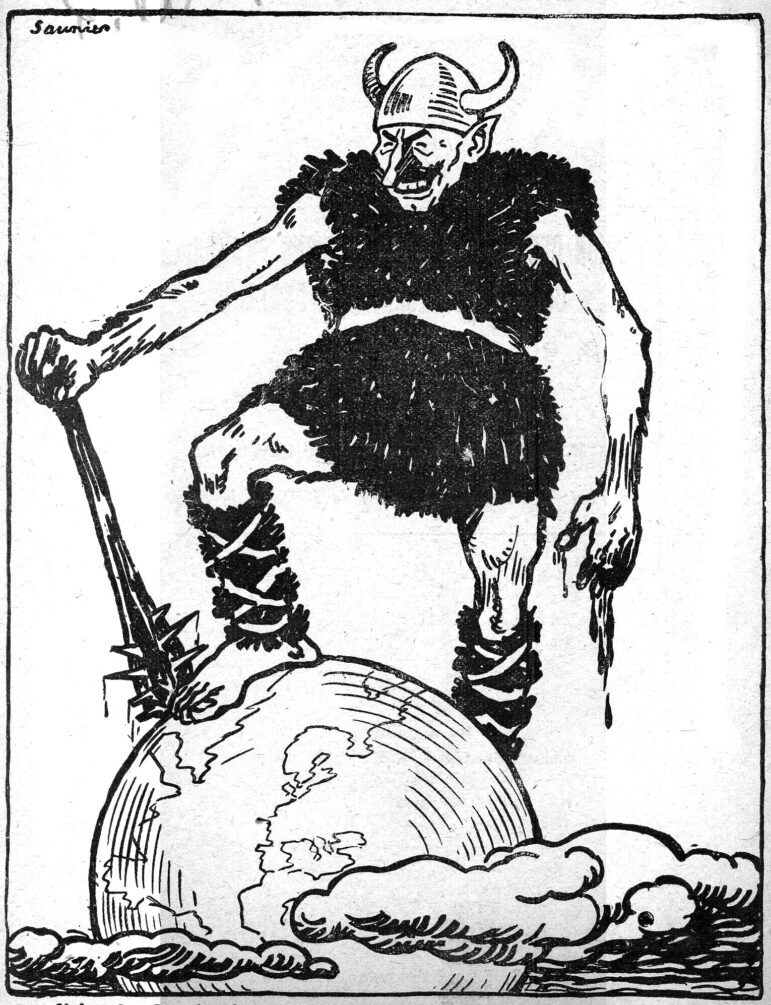
“What the Germans Would Like” (France, 1918) [Public domain]
While I served as President of Interfaith Dialogue at the university, I designed events to encourage a wider-than-usual spectrum of students to show up and participate. I consciously played down my own faith and perspectives, instead choosing to act as organizer and moderator, listening while others spoke.
An assistant director of Spiritual Life who was also an advisor for Muslim Affairs attended some of the programs and remarked that he had never seen such diverse and well-attended interfaith events on campus and that he had never seen such participation from the usually aloof graduate student population.
But afterwards, as I continued to struggle with years-long Spiritual Life administration stonewalling of Ásatrú visibility and participation in their own programming, he finally blurted out that anyone could google Heathenry and see that it was a Nazi religion.
Nothing I had ever done or said mattered. This was especially bizarre coming from someone who spent a great deal of his time and effort challenging stereotyping of Muslims in America after 9/11.
Around the same time, I was trying to promote Heathen participation in national-level interfaith organizations. An unfortunately typical interaction occurred with the executive director of a prominent interfaith nonprofit who was also a trained rabbi.
He contacted me on LinkedIn to (1) ask if I would hire his organization’s speakers to come to my university and (2) tell me that he had googled Ásatrú and found a racist website.
Despite the fact that the website had absolutely no connection to me or my work, despite his acknowledgment of my “solid academic credentials at a reputable university,” he repeatedly stated that I was somehow responsible for what he found on Google.
Again, nothing I had ever done or said mattered. Again, there was a bizarre disconnect: what made him most furious was some random Heathen website claiming that “the religion of our ancestors is the best one for us,” despite the fact that he served as clergy in a religion that traces inclusion via an individual’s maternal line of ancestors.
The great irony is that – abstracted from the website that so offended him – he would likely agree with the ancestry statement, while I have directly, publicly, and repeatedly denounced the very concept as a core tenet of gross white nationalist Ásatrú and Heathenry.
Life goes on.
What, me worry?
These days, there aren’t so many folks insisting that all Germans are intrinsically evil or that all German-Americans are naturally Nazis.
Villains in films have a wider variety of accents, and – on a more serious note – there seems to be spreading realization among average Americans that genocides occur outside of Germany, both historically and in the world today.
On the Heathen side, there appears to be a growing number of practitioners headed to universities to study various related academic subjects – Scandinavian studies, medieval studies, Old Norse, Old English, and so on. Time will tell whether their own work on the materials from the long-ago time will change perceptions of today’s practitioners in wider scholarly circles.
I’m not so worried about either group – German-Americans or Heathen-Americans. We’ll be fine.
The arrow of American bigotry has swung around to point at other groups, and things have become increasingly ugly as we move ever farther down the wrong road.
I’m worried about all those who are being targeted by Donald Trump as, less than a week into his second presidential term, we’re already drowning in the firehose effect from his endless proclamations, pardons, and executive orders.
On the president’s agenda during his first week: ending birthright citizenship, “getting rid” of the Federal Emergency Management Agency (FEMA), rescinding job offers already made by the National Park Service, detaining Native Americans, freeing approximately 1,250 convicted criminals who attacked the U.S. Capitol during the January 6 riot, conducting Immigration and Customs Enforcement (ICE) raids in multiple states (including California, Florida, Illinois, Minnesota, New York, and Utah), arresting hundreds of what the White House calls “illegal immigrant criminals” while flying hundreds more to Guatemala on military aircraft, and ending policies that prevented ICE from making arrests at “sensitive locations” (churches, hospitals, and schools).
And, of course, a Republican member of the House has already proposed a constitutional amendment to allow Trump to seek a third term.
Who could have predicted this?
“No one saw it coming,” but what they mean is that they consider the people who saw it coming to be no one. The category of “no one” includes the people smeared by Trump in his propaganda: immigrants, black Americans, Muslim Americans, Native Americans, Latino Americans, LGBT Americans, disabled Americans, and others long maligned and marginalized—groups for whom legally sanctioned American autocracy was not an unfathomable horror, but a personal backstory.
Sarah Kendzior, Hiding in Plain Sight: The Invention of Donald Trump and the Erosion of America (2020)
After decades of right-wing jackasses telling us “they wouldn’t have been able to put me into any Nazi concentration camp! I would’ve fought back!”, we now have the same demographic telling us that American concentration camps are just fine and good, actually.
In a somewhat awkward situation for the American Democrats who count themselves among the #resistance, President Biden gave billions of dollars to “America’s private immigration detention industry” to expand “detention centers” in anticipation of Trump’s long-announced mass arrests, even as the population of ICE jails skyrocketed by nearly 175% under Biden while he brushed aside reports of “horrific” and lethal conditions.
Hans, are we the baddies?
We now find ourselves right in that middle of that famous little text by German Lutheran pastor Martin Niemöller.
Based on a speech he made in 1946, it has appeared in various versions. Here’s how it is presented on the website of the United States Holocaust Memorial Museum:
First they came for the socialists, and I did not speak out—because I was not a socialist.
Then they came for the trade unionists, and I did not speak out—because I was not a trade unionist.
Then they came for the Jews, and I did not speak out—because I was not a Jew.
Then they came for me—and there was no one left to speak for me.
Niemöller himself varied the groups named, sometimes including communists, Jehovah’s Witnesses, and people with mental and physical disabilities.
Now, we ourselves can add those currently under attack by our own government in our own nation, including immigrants, children of immigrants, victims of natural disasters, federal employees, Native Americans, and victims of mob violence.
Despite Niemöller’s words echoing across the land longer than most of us have been alive, we’re simply sitting and watching all of this play out.
Oh, there are some politicians making noises, some lawyers preparing cases, some judges making rulings, and some protesters protesting, but how well have the politicians, lawyers, judges, and protesters served us recently? Did they prevent the ascension of the regime we now find ourselves under?
There used to be a popular thought experiment in ethics that asked whether, if given a time machine and the ability to visit baby Hitler in the crib, you would be willing to strangle the infant Adolf and prevent the Holocaust.
This week, we all saw Trump’s personal billionaire Elon Musk twice throw up a Hitler salute on live national television (if you still doubt that’s what it was, read what the German newspapers – who know a thing or two about national leaders saluting Hitler – have to say about it).
What were the consequences? A TV meteorologist in Milwaukee was fired for denouncing Musk’s Hitler salutes.
From stopping Hitler by any means necessary to firing those who dare to criticize ascendant American fascism is a hell of a cultural shift.
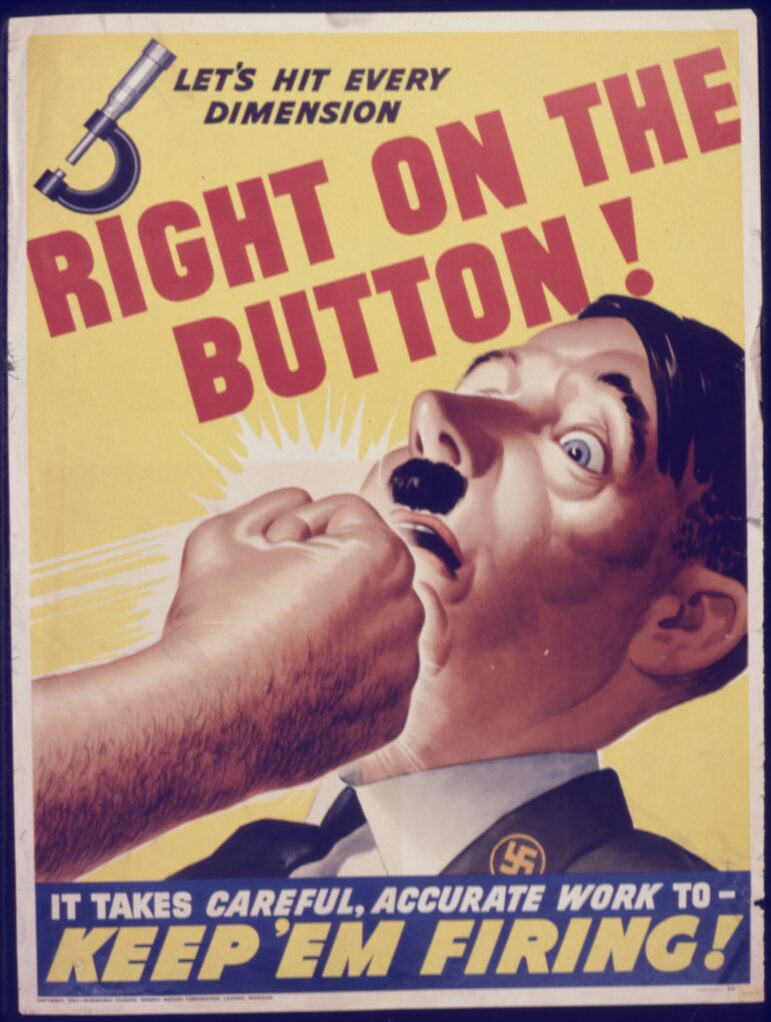
American anti-Nazi propaganda poster (1942) [Public domain]
Are we the villains or the heroes of the 21st century?
During this week’s inaugural prayer service at Washington National Cathedral, Episcopal bishop Mariann Budde addressed Trump directly:
Let me make one final plea, Mr. President.
Millions have put their trust in you and, as you told the nation yesterday, you have felt the providential hand of a loving God. In the name of our God, I ask you to have mercy upon the people in our country who are scared now.
There are gay, lesbian and transgender children in Democratic, Republican, and Independent families, some who fear for their lives. The people who pick our crops and clean our office buildings; who labor in poultry farms and meat packing plants; who wash the dishes after we eat in restaurants and work the night shifts in hospitals.
They… may not be citizens or have the proper documentation. But the vast majority of immigrants are not criminals. They pay taxes and are good neighbors. They are faithful members of our churches and mosques, synagogues, gurudwaras and temples.
I ask you to have mercy, Mr. President, on those in our communities whose children fear that their parents will be taken away. And that you help those who are fleeing war zones and persecution in their own lands to find compassion and welcome here.
Our God teaches us that we are to be merciful to the stranger, for we were all once strangers in this land. May God grant us the strength and courage to honor the dignity of every human being, to speak the truth to one another in love and walk humbly with each other and our God for the good of all people. Good of all people in this nation and the world.
Amen.
Donald Trump responded by calling her “nasty in tone, and not compelling or smart.” Mike Collins, House member representing Georgia’s 10th congressional district, tweeted that she “should be added to the deportation list.” Deacon Ben Garrett of Refuge Church in Utah publicly denounced her for committing “the sin of empathy” and called on Christians “to properly hate in response.”
So much for the American Christian mantra of Christ’s love and forgiveness.
So much for American heroism.
Our silent slide
Yes, let’s laud the bishop for delivering her message. Let’s celebrate her personal bravery and her willingness to speak out against evil from the true heart of her faith.
But, as my father taught – and as Odin does, as well – words must lead to action.
After decades of big talk about German fascists, what are we doing to stop the creeping fascism in our own country?
By the measure of my father’s teachings on human rights, spoken by someone who lived through some of the worst of what humanity had to offer in the mid-20th century, we’re not doing much.
Whatever faith we declare, what are we doing to stop these rushing horrors beyond making declarations?
What are we forcing (not asking) our civic and religious institutions to do?
What are we physically doing (not posting online) to stop ICE from rounding up immigrants?
If we don’t want future generations to be taught that all Americans are uniquely predisposed to evil, what are we willing to do right now to radically change the direction of our own era?
If we don’t want influential figures (like the professor, director, and rabbi discussed above) to tar all Heathens with the same stinking brush, what are we doing at this moment to actually fight (not just complain about) what’s happening around us?
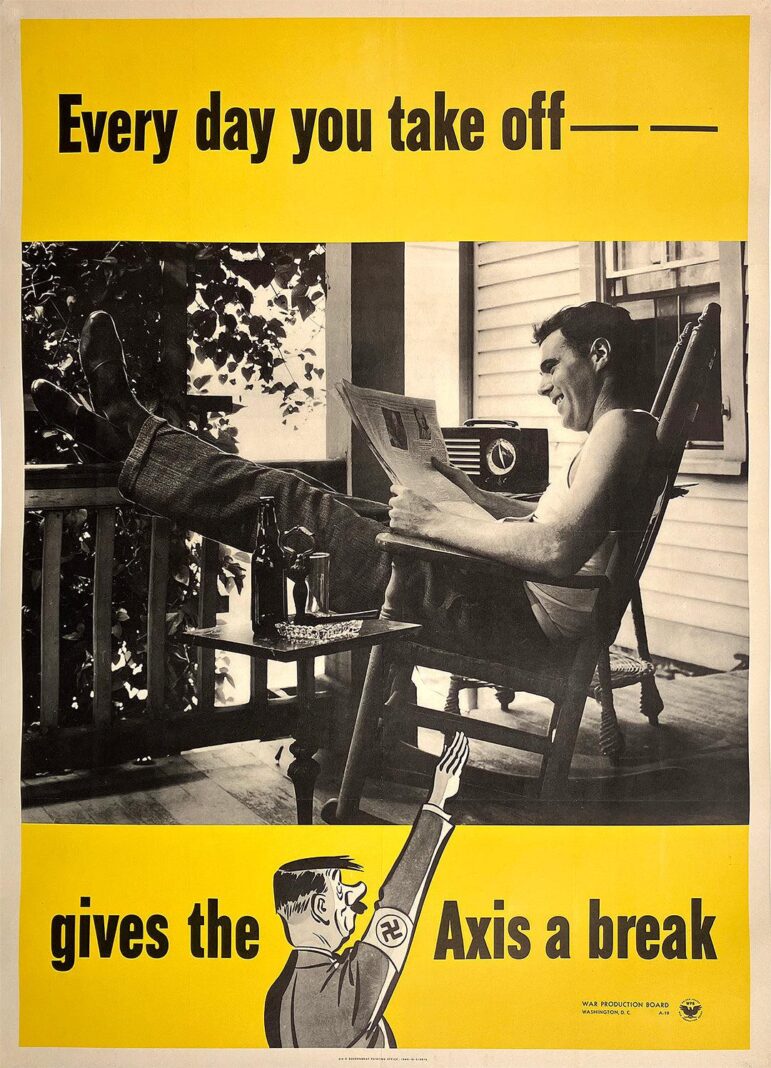
American anti-Nazi propaganda poster (1943) [Public domain]
Yes, yes. I know. It’s just not convenient right now.
We can all come up with very good reasons to not take real action.
We can’t miss work. We don’t want to lose our jobs, like that poor meteorologist.
We don’t want to get arrested. We don’t want to get pushed around by police.
We don’t want to disrupt things for other people. We don’t want the mail to be delayed.
We’re just so busy, so tired, and there’s so much good stuff streaming right now.
For every proposed action, there’s an equal and opposite reaction explaining why it wouldn’t do any good, anyway.
You can’t fight city hall, or Washington, or billionaires. You’re just one person.
Nothing will make a real difference.,
So, what are we going to do, now that we’re the baddies?
One thing is for sure. We need to stop piously intoning that Niemöller text like it’s some sort of American national creed.
It’s not. It’s a testament to our own failure, to our own silent slide into exactly that which we so long denounced.
The Wild Hunt is not responsible for links to external content.
To join a conversation on this post:
Visit our The Wild Hunt subreddit! Point your favorite browser to https://www.reddit.com/r/The_Wild_Hunt_News/, then click “JOIN”. Make sure to click the bell, too, to be notified of new articles posted to our subreddit.